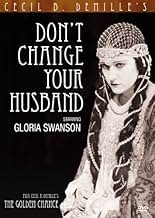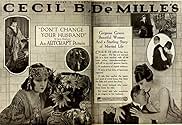Leila Porter comes to dislike her husband James, a glue king who is always eating onions and looking sloppy. But after she divorces him and marries two-timing playboy Schuyler Van Sutphen th... Read allLeila Porter comes to dislike her husband James, a glue king who is always eating onions and looking sloppy. But after she divorces him and marries two-timing playboy Schuyler Van Sutphen the now-reformed James looks pretty good.Leila Porter comes to dislike her husband James, a glue king who is always eating onions and looking sloppy. But after she divorces him and marries two-timing playboy Schuyler Van Sutphen the now-reformed James looks pretty good.
- Undetermined Role
- (uncredited)
- Manager of Gambling Club
- (uncredited)
- Croupier at Gambling Club
- (uncredited)
- Member of Gambling Club
- (uncredited)
- Mr. Frankel - Dressmaker
- (uncredited)
- Undetrmined Role
- (uncredited)
- Director
- Writer
- All cast & crew
- Production, box office & more at IMDbPro
Featured reviews
Although the old DeMille formula was beginning to change, and his films were becoming wordier and less purely visual, with such an expressive performer as Swanson we regain much of that silent storytelling style. Her character does very little, but conveys volumes through subtle gesture and facial expression – with a particular talent for looks of disdain. In real life Swanson was herself coming towards the end of her disastrous marriage to Wallace Beery, and it's possible that this fact fuelled her convincing performance.
As if to best complement his leading lady's talents, DeMille's use of framing and close-ups is particularly strong here. He uses cinematic technique to show off the acting – often holding Swanson in lengthy close-ups at key moments – and also to clarify the story visually. For example, when we are introduced to the character of Toodles, she is shown reflected three times in a dressing table mirror. Her character disappears from the story, only to become important towards the end. That attention-grabbing first shot of her helps us remember who she was. Later, at the anniversary dinner, Swanson and future husband number two Lew Cody are framed together in one shot, while Elliot Dexter is isolated in his own frame. Also – and this is a sign of the increasing sophistication of cinema in general – there is much use of reaction shots – for example the disapproving glance of the bishop when Cody acts out his intentions with the wedding figure dolls.
In contrast to DeMille's visual narrative method was the increasingly verbose screen writing of his collaborator Jeanie Macpherson. As I've remarked in several other comments, Macpherson could put together a strong and dramatic story, but like DeMille she tended to state her themes in a somewhat pretentious and flamboyant style. And so we get these very long quasi-philosophical title cards about the pitfalls of married life which, if they improve the story at all, it is only because they are unintentionally funny. For example, only Jeanie Macpherson could come up with a line like "Fate sometimes lurks in Christmas shopping". Fortunately though in this picture these titles mostly introduce scenes rather than break them up.
Although the pictures he made around this time tended to be small scale, it is at this point that DeMille seemed to develop his taste for the spectacular. You can see him start to sneak in excuses for a bit of razzmatazz like the little fantasy scenes of Swanson being showered with "Pleasure, wealth and love". It wouldn't be until the early twenties after the unofficial embargo on historical pictures was lifted that he would get the chance to go all out with the grand spectacle.
All in all, Don't Change Your Husband is a fairly decent DeMille silent picture, although to be honest it is only really the presence Gloria Swanson that lifts it above the average. It's curious though that this is supposedly a comedy, and Swanson was cast at least in part because of her background at Mack Sennett's slapstick factory. She hated comedy acting, and here gives a dramatic rather than a comic performance. It makes sense then that the only straight drama she did with DeMille, Male and Female, was by far the strongest of their collaborations.
The three principals are fine, with Swanson most impressive in the pivotal role as the woman torn. Julia Faye grabs supporting honors as Cody's other interest, "Toodles"; off-screen, she tempted director Cecil B. DeMille. The DeMille touch is evident; especially in an imaginary sequence wherein Cody promises Swanson... "Pleasure Wealth Love "
******* Don't Change Your Husband (1/26/19) Cecil B. DeMille ~ Gloria Swanson, Elliott Dexter, Lew Cody
Don't Change Your Husband was one of DeMille's silent comedies with a Victorian moral to every one. Here Swanson is a bored wife married to comfortable and stuffy DeMille regular Elliott Dexter. He barely notices the wife any more, keeping his head buried in the newspaper in the morning. He also has a nasty habit of eating raw onions and that will kill romance like nothing else will.
But he's provided for Swanson well including a nice set of jewelry and even though Dorothy Parker hadn't said it yet, diamonds are a girl's best friend.
One day a real Snidely Whiplash type villain Lew Cody starts putting the moves on Swanson. She divorces Dexter and marries Cody. But Cody just wants her jewels for business and to shower on another and badder girl Julia Faye.
DeMille was a child of the Victorian era and this film ends just about as the title suggests. The title itself really gives it all away.
Julia Faye who was one of DeMille's mistresses appeared in most of his feature films right up to the second Ten Commandments. Another was Jeanie MacPherson who was an actress as well as a screenwriter. She did the script for this and many other DeMille films. Lastly there was Gladys Rosson who was his private secretary and on every set right up to The Greatest Show On Earth. He had a regular harem going, but all these women even after the relationship was over were well taken care of work wise.
In fact Faye has one of the more meatier parts in her career as the other woman in Don't Change Your Husband. If this was sound one can only imagine the dialog between Swanson and Faye.
Don't Change Your Husband was the beginning of a fine collaboration between a great director and great star.
** (out of 4)
Second in a semi-trilogy following Old Wives for New, this film tells the story of a husband (Elliott Dexter) who eats onions (?!?!?), neglects his wife (Gloria Swanson) and takes her for granted. The wife gets fed up after he forgets their anniversary so she divorces him for a better looking man (Lew Cody) who she thinks will treat her right but we all know he's going to turn out to be a jerk. This is a rather strange mix of light comedy and melodrama but the two don't mix well together. Whereas Old Wives for New was a pretty strong comment on society, this film just comes off as a tamed down version with the sexes switched. Perhaps my sense of humor just isn't where it should be but the constant running joke of the husband eating onions and then trying to kiss his wife just got boring to me. Perhaps a female would find these jokes funnier but I doubt it. Another problem I had was that the wife really wasn't that sympathetic. I honestly can't say that I cared for her in any way, shape or form and the strange thing is that the husband actually gets the sympathy. With that in mind, it's rather hard for us to want to see the husband take her back after the way she's treated him. This was apparently the film that finally launched Swanson as a star but I really didn't see anything here too special. Her performance here certainly wasn't in the same league as a Gish or Pickford but even if we don't put her up to those standards I still found the performance rather lacking. I wasn't impressed with Cody either as the playboy as he too come off rather stiff and wooden. Dexter on the other hand delivered a fine performance and he's the main reason to watch this film. I wouldn't say his comic timing was overly impressive but he did a fine job in the more dramatic moments. There are a couple interesting sequences here with a couple appearing as fantasy sequences where the wife dreams of what her life will be like with the playboy. The feeding of grapes is something to see but there are very few moments like this one.
This little romantic comedy clips along from scene to scene with a few exotic twists (some imaginary scenes and a costume party). All of this is centered around the wife of the husband(s) who is looking to break out of the doldrums, played by Gloria Swanson (she is twenty here!). Both the leading men have a natural air that is convincing and of course Swanson is perfect in all kinds of moods, from frivolous to worried to hopeful.
Behind all the games and apparent lightheartedness is that old serious problem of staying in love and not straying in love. There's a little corniness, but director DeMille is on top of keeping it snappy and believable in all. As with many films from this period, the subtitles do not just tell what they are saying (or thinking) but often give a kind of philosophical insight, as if to justify the tragedy (or raciness). And there is that higher purpose here, probably better without the instructional text, but it's part of the narrative style, and it's kind of quaint.
If you are looking for visual or formal amazement, you won't find it here. But as a story, well acted, and filmed with precision and economy, it's really a great example. The events might not come as a total surprise, but it's such a modern love story, set almost a hundred years ago, it's a gas. And did I saw Swanson was perfect?
Did you know
- TriviaThis is the first collaboration between Gloria Swanson and Cecil B. DeMille.
- Quotes
First Title Card: This does not deal with the tread of victorious Armies, nor defeated Huns - but is just a little sidelight on the inner life of Mr. and Mrs. Porter - who found that they should not have looked for their marital troubles with a Telescope - but with a Microscope.
- ConnectionsFeatured in Boulevard! A Hollywood Story (2021)
Details
- Release date
- Country of origin
- Language
- Also known as
- Mannen du gav mig
- Production company
- See more company credits at IMDbPro
- Runtime
- 1h 11m(71 min)
- Color
- Sound mix
- Aspect ratio
- 1.33 : 1



































